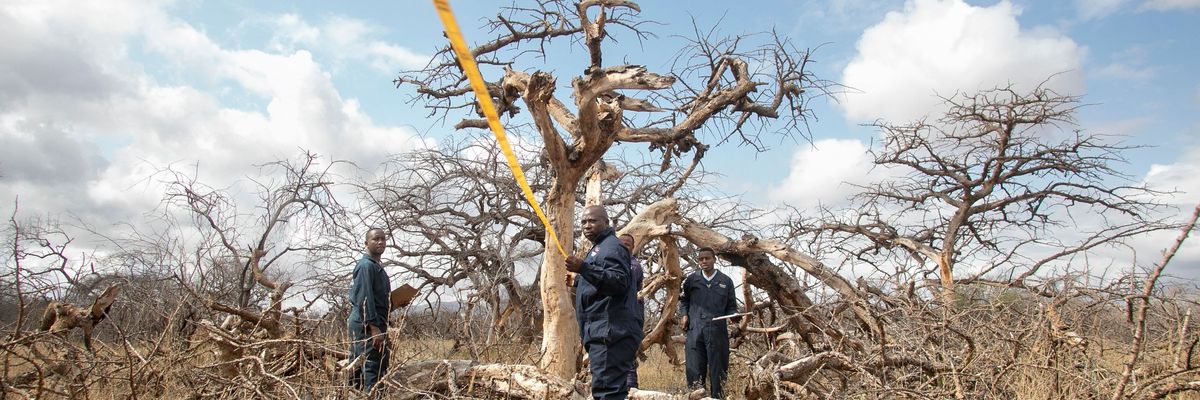A coalition of climate groups
had a message for world leaders on Monday, Finance Day at the United Nations Climate Change Conference: "Stop carbon offsetting now!"
The conference, COP28, is hosted in Dubai by the United Arab Emirates—which, as the coalition highlighted in a joint statement, is set to "hold numerous promotional thematic events," despite two decades of negative impacts from carbon offset schemes.
"Carbon offset trading is reckless and irresponsible," declared Jutta Kill of the World Rainforest Movement—part of the coalition that includes ETC Group, Focus on the Global South, GRAIN, Indigenous Environmental Network, Just Transition Alliance, and the Oakland Institute.
"Throughout 2023,
academic research, media, and civil society investigations have exposed how these projects routinely generate phantom offsets and result in land grabbing and human and Indigenous rights violations," the organizations noted, pointing to "the forced relocation of Ogiek Peoples in Kenya's Mau Forest" and "extensive sexual abuse at a Kenyan offset project."
"Over the past months, Kenya, along with Liberia, Tanzania, Zambia, and Zimbabwe, have signed deals with Dubai-based Blue Carbon
covering a total of over 24 million hectares of community lands," the coalition continued. "Carbon offset project developers, standards bodies, auditors, and credit providers have pocketed millions from churning out carbon credits that have failed to reduce emissions and exacerbated the climate crisis."
One "damning" probe from September
found that nearly 80% of the top carbon offset schemes be deemed "likely junk or worthless." Another study from that month, focused on Reducing Emissions from Deforestation and Forest Degradation (REDD+) projects, similarly concluded that reductions were dramatically exaggerated.
"At COP28, world leaders and climate negotiators need to recognize once and for all that carbon markets are a failed source of climate finance. They are volatile and unstable, marked by fraud, incapable of reducing emissions, and actually harm communities," Oakland Institute executive director Anuradha Mittal said Monday.
The coalition pointed out that in addition to impacts such as relocations and abuse, "these projects, many of which are repackaged as so-called 'nature-based solutions' or 'natural climate solutions' or, when done at coastal and marine areas, as 'blue carbon,' have also drawn peasant and Indigenous communities into costly and complicated legal battles in their effort to affirm their rights and reclaim community territories and in their fights to resist the projects."
The
Kichwa communities in the Peruvian Amazon, Dayak communities in Indonesia, and Aka Indigenous communities and Bantu farmers in the Republic of Congo's Bateke Plateau are among those negatively affected by carbon offsetting schemes.
"Over 20 years of history with offsets have resulted in the rights of Indigenous peoples being violated, increased land grabbing, and disproportionate impacts on Indigenous environmental defenders," stressed Indigenous Environmental Network executive director Tom Goldtooth. "The false solutions will become a crime against humanity and Mother Earth."
GRAIN's Devlin Kuyek said that "they prop up a system that has enabled corporate polluters and rich countries to delay action and profit from the crisis. Whether unregulated or with a U.N. seal of approval, carbon offsetting in all its shapes and forms, including REDD or so-called 'nature-based solutions' and 'blue carbon,' is a fraud that must be immediately scrapped."
The coalition asserted that rather than carbon offsetting, "what is urgently needed is renewed focus on keeping fossil fuels in the ground and commitments to
real climate action based on equity and justice."
As Friends of the Earth International's Kirtana Chandrasekaran put it: "What we need are real emissions reductions and real climate finance. Anything less is failure."
The coalition's demands contrasted sharply with Sunday
comments from Sultan Ahmed Al Jaber, COP28 president and Abu Dhabi National Oil Company CEO, who claimed there is "no science" behind the push to rapidly phase out planet-heating fossil fuels—which one leading expert said "dismisses decades of work" by global scientists.
Going into COP28, a U.N. analysis
warned that countries' currently implemented policies put the world on track for 3°C of warming by 2100, or double the Paris agreement's 1.5°C target. Already, the planet has warmed about 1.1°C relative to preindustrial levels.
Even though the international community is way off track in terms of meeting its climate goals, Bronwen Tucker, global public finance lead at Oil Change International, pointed out Monday that "on Finance Day at COP28, instead of rich country governments committing to pay their fair share for a fossil fuel phaseout, they tried to shirk their responsibilities."
The biggest historical contributor to planet-heating pollution, the United States, and foundation partners on Sunday announced the Energy Transition Alliance. Rachel Cleetus, the policy director and a lead economist for the Union of Concerned Scientists' Climate and Energy Program, said the offset initiative "is still very much a work-in-progress, and the details shared thus far raise a fair degree of skepticism about its ability to meaningfully contribute to addressing the climate crisis."
"Richer nations and large corporations should have no claim over monetizing the scarce remaining carbon budget and yet this program is premised on that unjust idea," Cleetus added. "At COP28, the primary focus should be on securing an agreement among nations for a fast, fair fossil fuel phaseout and ramping up public finance."
